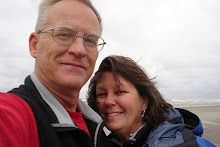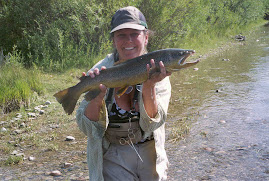Boondocking, as in living off the land, cheaply, without hookups.
Conservation, as in saving water, electricity, propane, diesel and battery power.
Boondocking, at least for us in Quartzsite, means living within our means. Oh, the cost of staying at a BLM area is cheap. Only $40 for 14 days or $180 for September through April. Pretty affordable if you can live without being constantly hooked up to electricty, water and a sewer dump. What I mean about living within our means is being able to be self-sustaining with what resources we have within the motorhome.
I don't think I'm going to get into anything too terribly technical here, but rather, just give you an idea of some of the ways we conserve during our 2 week stay in the Quartzsite desert. Once you're parked and have set up camp, you try to not move the RV in order to save on fuel. However, there comes a time when your grey water and black water tanks fill up and you either have to drive to the dump station, have a honey wagon come to you and drain it, or you use a "blue boy" transporter. More on "blue boys" later.
Lets start with the number one necessity in life = water! It helps that we have good size holding tanks in the motorhome. Some people carry 55 gallon barrels in the back of their trucks so they can bring more water to their RV without moving it. We had to move the motorhome after about a week to get service done, so we dumped and filled up with fresh water then. How long you can last all depends on how much water you use to wash dishes, take a bath, flush the toilet, brush your teeth, etc. You learn real fast to not let it run freely like we do at home. Or used to do at home. You want to be clean and sanitary, but you want to conserve. We've used some paper dishes, but like the real silverware. We drink some bottled water, but we also trust our filtration system. When we shower (every day) we get into the shower sooner, when the water is still cold! Once we are thoroughly wet, we push the button on the shower head to stop the water. We soap up and shampoo, then we push the button again to let the water flow. I think I've heard this called a Navy shower. I've thought of one way we could conserve more water during the shower process, but haven't really felt the need. When the shower water is warming up, a lot of water is wasted down the drain. We could capture that first water in a bucket and later use it to wash dishes or even to flush the toilet. That would really be conserving water! In the morning when I'm preparing to wash my face, I turn on the hot water and fill up my water bottle. That gets the water a little warm before I splash it on my face! And you only let it dribble. Well, I only let it dribble so I don't waste too much. When you flush you want to use all the water you need. There can be other problems if you don't use enough water in the toilet. You want the solid material to have enough water to drain out of your tanks.
Using the BBQ to cook also helps to conserve water by not having a lot of pots and pans to clean up. It does use propane though. We've probably used more propane in these 2 weeks than we did all of last year. While here we've used propane to run the refrigerator, freezer and the stove top burners. Also to heat the hot water tank. Although we have a propane furnace, we haven't used it but instead run the electric "big heat" portable heater when the generator is running. It just hasn't been cold enough.
Talking about heat and cold weather, you learn to open your window shades to let in the warm sunlight. Or to pull a window awning out if the heat is too much. Being in the southwest desert, our temps have been very moderate. It does get cold around 4 AM, but I avoid the tile floors at that time of day, preferring to stay between the sheets. There were a couple afternoons when the motorhome heated up and all I did was open a couple windows to cool it off. Rick says he's like a cat sitting in his recliner in the sun, absorbing the heat through the tinted dual pane windows. The dual pane windows help to keep the warmth in and the cold out, as well as noise reduction. Love our windows!
We run the generator morning and night. Not FROM morning to night, not all day long, just a couple hours in the morning and a couple hours before going to bed. The electric heating blanket sure is nice to have, warming up the sheets before we hit the sack! The quiet hours here are from 10 PM to 6 AM, meaning no generators through the night. When the generator is running we have a full 50 amps of power, enough to run everything in the motorhome. Well almost everything. Everything installed. There is an energy management system that 'regulates' the appliances. I admit that I overloaded the generator one morning. I still claim it was the cold medicine that made me do it. I was multi-tasking when I started making breakfast. The generator was running so I said what the heck! The TV was on, the coffeemaker was on, and the small electric heater was going. I turned on the microwave, dropped some toast into the toaster, and turned on my hair dryer. I also had the laptop running and the electric hot water heater. Of course the electric heating blanket was still on as well as many lights. Anyway, you get the idea, multi-tasking. It all came to a sudden stop and Rick had to find the blown circuit breaker at the bottom of the generator. The 8K Onan generator is located at the very front of the coach, in an outside compartment. He came back in after resetting it and once again we had a talk about electricity. Someday it will be clear to me and I'll be able to explain it, but for now I'm blaming the cold medicine for the temporary mental lapse.
The generator uses diesel fuel, the same diesel fuel that powers our diesel engine. I think Rick is keeping track of the hours on the generator so he can calculate the fuel use of the engine and the MPG. This last year we averaged almost 8 miles per gallon while driving, sometimes better, sometimes not. We've used our generator more in these last 2 weeks than we did all last year. But that's a good thing. They say you need to run your generator every month and with it pulling a full load. For more on "pulling a full load", see the paragraph above.
While we have the generator running, it also recharges the 6 batteries in the coach. And we recharge the camera batteries, the cell phones, toothbrush, hand vacuum, and razor while the generator is running. Having well charged house batteries allows us to use the invertor for power. The inverter makes the 12 volts into 110 (or battery power to AC power). We're able to run the TV, computers, and other outlet plugs with the inverter for several hours, until the batteries get low. They get recharged when the generator is running again.
Some people have solar panels on the top of their RVs which recharge their batteries. This means they don't need to run the generator (as much) and they save fuel. Most generators use diesel or gas fuel, both costly compared to using the natural energy of the sun. Here in the southwest there's usually plenty of sun to keep the batteries charged. Not sure of the cost of solar panels, but we did have them on our 5th wheel trailer 20 years ago and used them when we didn't have electric hookups. If we were to spend much time boondocking, the cost of the panels would be recooped, especially if the cost of diesel stays high.
I didn't get into the details of electricity and batteries, how long they will last pulling so many amps, but Rick could explain all that if you wanted. Me, I just want to know how long I can use my laptop before it goes black.














Geez Louise!!! You must have been bored today! I really loved your comments about saving water and your big blowout with multi-tasking.. I can just imagine. Loved the pictures--especially the black Chevy!
ReplyDelete